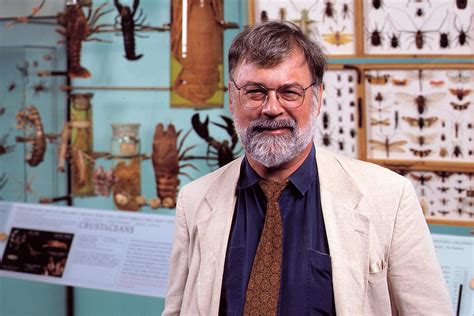A Quote by David M. Raup
Ironically, we have even fewer examples of evolutionary transitions than we had in Darwin's time.
Quote Topics
Related Quotes
Paleontologists ever since Darwin have been searching (largely in vain) for the sequences of insensibly graded series of fossils that would stand as examples of the sort of wholesale transformation of species that Darwin envisioned as the natural product of the evolutionary process. Few saw any reason to demur - though it is a startling fact that ...most species remain recognizably themselves, virtually unchanged throughout their occurrence in geological sediments of various ages.
If it is true that an influx of doubt and uncertainty actually marks periods of healthy growth in a science, then evolutionary biology is flourishing today as it seldom has flourished in the past. For biologists collectively are less agreed upon the details of evolutionary mechanics than they were a scant decade ago. Superficially, it seems as if we know less about evolution than we did in 1959, the centennial year of Darwin's on the Origin of Species.
Considering that we live in an era of evolutionary everything---evolutionary biology, evolutionary medicine, evolutionary ecology, evolutionary psychology, evolutionary economics, evolutionary computing---it was surprising how rarely people thought in evolutionary terms. It was a human blind spot. We look at the world around us as a snapshot when it was really a movie, constantly changing.
The Bumpuses were so low down on the evolutionary totem pole that they weren't even included in Darwin's famous family tree. They had inbred and ingrown and finally emerged from the Kentucky hills like some remnant of Attila the Hung's barbarian horde. Flick said that they had webbed feet and only three toes. It might have been true.
The truth is few people “think” big and even fewer “play” big. Why? Because “big” often means big responsibilitie s, big hassles and big problems. They look at that “bigness” and shrink. They’re smaller than their problems. They back away from challenges. Ironically, they back themselves into the biggest problem of all ... being broke, or close to it.
A Chinese paleontologist lectures around the world saying that recent fossil finds in his country are inconsistent with the Darwinian theory of evolution. His reason: The major animal groups appear abruptly in the rocks over a relatively short time, rather than evolving gradually from a common ancestor as Darwin's theory predicts. When this conclusion upsets American scientists, he wryly comments: "In China we can criticize Darwin but not the government. In America you can criticize the government but not Darwin."
Darwin seems to lose out with the public primarily when his supporters force him into a mano-a-mano Thunderdome death match against the Almighty. Most people seem willing to accept Darwinism as long as they don't have to believe in nothing but Darwinism. Thus, the strident tub-thumping for absolute atheism by evolutionary biologists like Richard Dawkins, whom the new issue of Discover Magazine rightly criticizes as "Darwin's Rottweiler," is self-defeating.



































